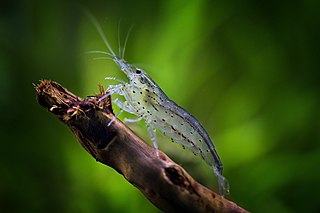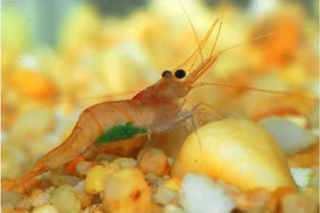
Lake Victoria is one of the African Great Lakes. With a surface area of approximately 59,947 km2 (23,146 sq mi), Lake Victoria is Africa's largest lake by area, the world's largest tropical lake, and the world's second-largest fresh water lake by surface area after Lake Superior in North America. In terms of volume, Lake Victoria is the world's ninth-largest continental lake, containing about 2,424 km3 (1.965×109 acre⋅ft) of water. Lake Victoria occupies a shallow depression in Africa. The lake has an average depth of 40 m (130 ft) and a maximum depth of 80–84 m (262–276 ft). Its catchment area covers 169,858 km2 (65,583 sq mi). The lake has a shoreline of 7,142 km (4,438 mi) when digitized at the 1:25,000 level, with islands constituting 3.7% of this length.

Caridina multidentata is a species of shrimp in the family Atyidae. It is native to Japan and Taiwan. Its common names include Yamato shrimp, Japanese shrimp, Amano shrimp, and algae shrimp.

Lake Towuti is a lake in East Luwu Regency, South Sulawesi province, Indonesia. Surrounded by mountains, it is the largest lake of the island of Sulawesi and one of the five lakes of the Malili Lake system. A river flows from the lake to the Boni Bay. The town Laronda is located on its shore.

Lake Matano, also known as Matana, is a tropical lake in East Luwu Regency, South Sulawesi province, Indonesia, that is noteworthy for the unique environment in its deeper layers.
Paratherina striata is a species of fish in the subfamily Telmatherininae, part of the rainbowfish family Melanotaeniidae. It is endemic to Indonesia where it occurs in Lakes Towuti, Wawontoa and Matano on the island of Sulawesi.

Telmatherina is a genus of sailfin silversides endemic to the Indonesian island of Sulawesi. They are restricted to the Malili Lake system, consisting of the large Matano and Towuti, and the small Lontoa (Wawantoa), Mahalona and Masapi. They are also found in rivers and streams that are part of this lake system.

Lake Barombi Mbo or Barombi-ma-Mbu is a lake near Kumba in the Southwest Region of Cameroon. It is located in the Cameroon volcanic chain, and is the largest volcanic lake in this region. It is one of the oldest radiocarbon-dated lakes in Africa, with the youngest lava flow in it being about one million years old. On old colonial maps the area was known as Elefanten Sea, but the elephants living in the area were extirpated due to ivory trading.

Caridina nilotica is a species of freshwater shrimp in the family Atyidae. It is native to Africa from the River Nile in Egypt to Lake Sibaya, South Africa, and is the only species of shrimp in Lake Victoria.

Caridina dennerli is a small species of freshwater shrimp from Sulawesi (Indonesia) that grows up to 2.5 centimetres (1.0 in) in length. It takes its name from the German company Dennerle, which supported the expedition that led to the scientific description of the species. It is popularly known as the 'cardinal shrimp' in the aquarium trade.

Caridina cantonensis, the bee shrimp, is a species of small freshwater shrimp in the family Atyidae. It is native to Taiwan. These shrimp are scavengers, and eat small pieces of decayed vegetation and algae. Bee shrimp have a life span of about 18 months. They enjoy a temperature in the 70 to 78 °F range. Many modern versions of bee shrimp are selectively bred for their characteristics.

Caridina spongicola is a small species of freshwater shrimp from Sulawesi (Indonesia) that reaches 0.64 to 1.27 cm in length. In the wild it strictly lives on an undescribed species of freshwater sponge, making it one of only two known commensal species of freshwater shrimp. It is popularly known as the harlequin shrimp, and also sometimes Celebes beauty shrimp or sponge shrimp in the aquarium trade. It is often confused with Caridina woltereckae, a larger and more contrastingly colored species found in the same region as C. spongicola.

Parathelphusa pantherina, commonly known as the "panther crab", is a variety of freshwater crab from Indonesia from the family of the Gecarcinucidae. The scientific name of the species was published for the first time in 1902 by Schenkel. The species is categorized as Endangered by IUCN Red List due to damage to their habitat by mining of nickel from lake shores where they live, which negatively impacts their water quality.

Caridina woltereckae, or Sulawesi harlequin shrimp as it is commonly known in the aquarium hobby, is a freshwater shrimp from Sulawesi, Indonesia. It is endemic to Lake Towuti. It resembles the smaller and less contrastingly coloured Caridina spongicola, which is endemic to the same lake.
Caridina striata is a freshwater shrimp from Sulawesi. It is endemic to Lake Poso and Lake Towuti. Common names in the aquarium hobby are red line shrimp and red stripe shrimp. It is commonly found on rocky substrates.

Caridina loehae is a freshwater shrimp from Sulawesi. It is known as mini blue bee and orange delight shrimp in the aquarium trade. It is endemic to the Malili lake system. It lives on rocky substrates at a maximal depth of 5 metres.
Caridina masapi is a freshwater shrimp from Sulawesi. The species is endemic to the Malili lake system. It is commonly found on rocky substrate.
Caridina lanceolata is a freshwater shrimp from Sulawesi. It is widespread in the Malili lake system, including all three lakes. It can be found in pelagic swarms, as well as on a variety of substrates.

Caridina glaubrechti is species of lacustrine fresh water shrimp endemic to western part of Lake Towuti on the Indonesian island of Sulawesi. It is named in honor of German Zoologist Matthias Glaubrecht.

Caridina profundicola is species of fresh water shrimp endemic to Lake Towuti on the Indonesian island of Sulawesi.

Caridina holthuisi is a species of freshwater shrimp in the family Atyidae, endemic to the Malili lake system in Sulawesi, Indonesia. It can be found in Lake Towuti, Lake Matano, and Lake Mahalona, as well as the Petea river. It is named in honour of Dutch carcinologist, Lipke Holthuis.
















